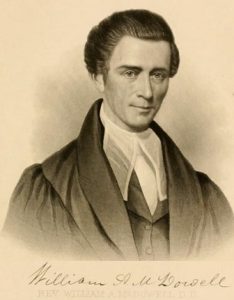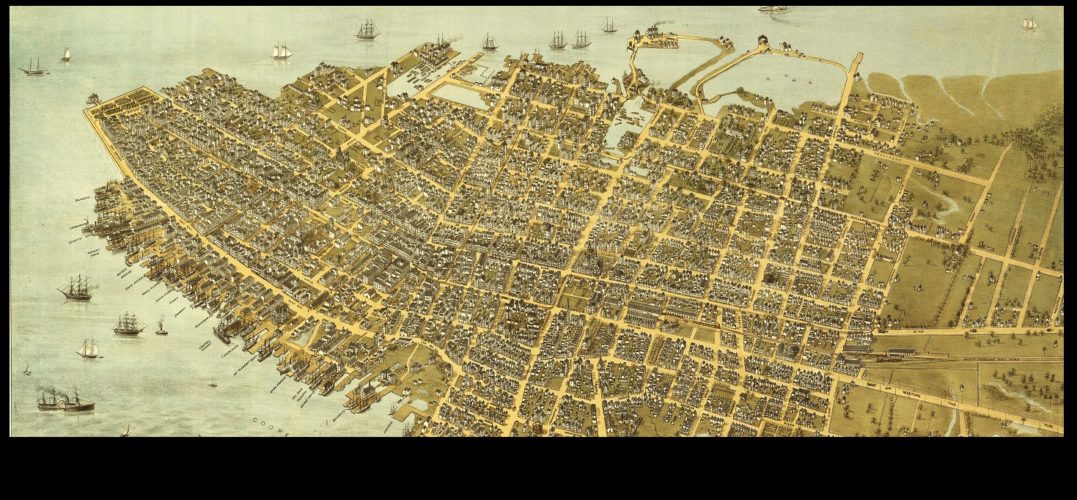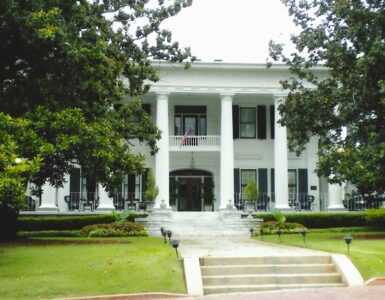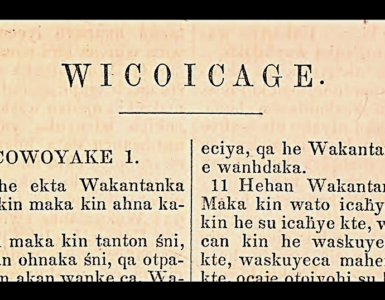 William Anderson was born to Matthew and Elizabeth Hay (Anderson) McDowell in Lamington, New Jersey, May 15, 1789. His elder brother by nine years was John McDowell. His parents were born in the American Colonies and were descendants of Presbyterians from Scotland. His early education was received at home while fitting studies into a daily schedule that included chores for the family farm. Henry Mills of Elizabethtown prepared William to enter the College of New Jersey. He began his studies with the junior class and graduated in 1809 with future seminary professors John De Witt (New Brunswick Seminary), and Thomas H. Skinner who would teach in Union Seminary, New York, and become the moderator of the New School General Assembly in 1854. A year later he went to live with pastor of the Freehold Church, John Woodhull, to be tutored in theology. McDowell enjoyed his time with the family but after a few months he returned to the College of New Jersey to be a tutor while studying theology with the college president, Samuel Stanhope Smith. He was taken under care of the Presbytery of New Brunswick but could not continue his education in New Jersey due to reoccurring health problems, so he moved to Savannah hoping the warmer climate would relieve his illness while studying with Henry Kollock, the minister of Independent Presbyterian Church. In April 1812, William returned to New Jersey and joined the first class of Princeton Seminary that fall. After a few months under the teaching of Princeton’s first professor, Archibald Alexander, he told his brother John about life in the new seminary in a letter dated December 2, 1812.
William Anderson was born to Matthew and Elizabeth Hay (Anderson) McDowell in Lamington, New Jersey, May 15, 1789. His elder brother by nine years was John McDowell. His parents were born in the American Colonies and were descendants of Presbyterians from Scotland. His early education was received at home while fitting studies into a daily schedule that included chores for the family farm. Henry Mills of Elizabethtown prepared William to enter the College of New Jersey. He began his studies with the junior class and graduated in 1809 with future seminary professors John De Witt (New Brunswick Seminary), and Thomas H. Skinner who would teach in Union Seminary, New York, and become the moderator of the New School General Assembly in 1854. A year later he went to live with pastor of the Freehold Church, John Woodhull, to be tutored in theology. McDowell enjoyed his time with the family but after a few months he returned to the College of New Jersey to be a tutor while studying theology with the college president, Samuel Stanhope Smith. He was taken under care of the Presbytery of New Brunswick but could not continue his education in New Jersey due to reoccurring health problems, so he moved to Savannah hoping the warmer climate would relieve his illness while studying with Henry Kollock, the minister of Independent Presbyterian Church. In April 1812, William returned to New Jersey and joined the first class of Princeton Seminary that fall. After a few months under the teaching of Princeton’s first professor, Archibald Alexander, he told his brother John about life in the new seminary in a letter dated December 2, 1812.
I fear you will begin to think, from my long silence, that I have forgotten you; but it is the press of business alone that has prevented my writing. From early in the morning until late at night I am constantly engaged; and to be able to write even now, I am under the necessity of being absent from recitation. My recitations with the class to Dr. Alexander take up most of my time. We recite every day, and our recitations are unusually long and difficult; and to accomplish the object I have in view in spending the winter here—namely, to prepare myself to take license in the spring, I have to apply myself with very great diligence. My being clerk also to the Theological Society, which now meets twice each week, adds considerably to the amount of my labor. So, you will be able to judge how much I have upon my hands, and will readily forgive me if I should not, during the winter, write as frequently as I have been in the habit of doing.
The number of theological students, since the commencement of the session, has increased. Nine is our present number, and we are in expectation of more. Dr. Alexander devotes most of his time to us. We all love him, and often render our united thanks to God that He ever put it into the hearts of the members of the Assembly to appoint him to the Professorship. He is certainly one of the best and most exemplary of men, and I do not think a more judicious choice could have been made. The students are excellent young men. We meet together three evenings in the week for social prayer and reading the Scriptures. Our meetings are all very solemn, and I think the time is not far distant when God will revive his work in this place. There are too many fervent prayers offered up here, not to be answered. In college we have many new regulations, and much more order than formerly. Dr. [Ashbel] Green’s popularity has been considerably increased by his having adopted it as a rule to invite eight, each week, out of the Senior Class, to dine with him. An important change has been effected in the prayer-hall—the services being marked by a much deeper solemnity than formerly. Dr. Green has introduced singing in the morning, and the students appear pleased with it.
William McDowell was delayed writing the letter because of the “press of business” not only from seminary studies but also because he continued to tutor in the College of New Jersey. The observations about the opening fall session show the emphasis on recitation of memorized studies which were then analyzed by the professor and class. Students also had to be ready for impromptu questions from Alexander. McDowell echoes the affection for Archibald Alexander that was expressed by nearly all who made his acquaintance. Alexander was a pastor for a number of years and transitioned from a congregation to become shepherd of theological students in the seminary. The emphasis on prayer in the midst of heavy study shows the importance of God’s gracious condescension as he blessed the seminarians and others in their lives.
McDowell continued seminary studies until he passed examination before the Board of Directors and received his certificate of completion in May 1813. He had already been licensed to preach by the Presbytery of New Brunswick, April 28, 1812. The Presbyterian Church in Bound Brook called him; he was ordained and installed by New Brunswick Presbytery December 22. As new ministers often did, William married not long after installation. Jane Kollock the daughter of Shepherd Kollock (brother of Henry) was his bride. After less than a year, the call to Bound Brook was dissolved and he was installed in the church in Morristown in December 1814 after declining a call from the church in Flemington.
Morristown was a good ministry for McDowell but health issues troubled him again, so another trip to the South was in order. Spending the winter in the milder climate rejuvenated him for a return to ministry in Morristown, but then the sickness returned. Given his experiences in the milder South the opportunity to move and reside there was provided with a call to become the first pastor of Third Presbyterian Church in Charleston, South Carolina. The ministry in Morristown was blessed and fruitful and it was difficult to leave but the health concerns influenced him to accept the call. The Presbytery of New Brunswick dissolved his pastoral relationship in October, so he moved the household to Charleston where he was installed by Charleston Union Presbytery in Third Church December 3. The church was located at the corner of Archdale and West Streets. Third would become Central Presbyterian Church in 1852. The climate was, as expected, suitable for improving his health and serving in Charleston with the increasing Presbyterian presence in the city offering him challenges and opportunities not only with his flock but also as a churchman in the judicatories.
In 1832, he was selected to be professor of theology and the financial agent for Columbia Theological Seminary. McDowell had taken great interest in Columbia from its founding and he worked for its growth and financial stability, but he declined the offer commenting that agitation in South Carolina prohibited him from accepting the call. What was the agitation? Likely, he was referring to political unrest leading up to nullification of the United States tariffs of 1828 and 1832 on November 24. The era was unsettling because unresolved issues since the earliest days of the nation regarding states rights, slavery, and federalism were disturbing the nation. However, there was more to his decision than politics as he informed his brother on January 2, 1833.
As for the Professorship, you will have learned from the newspapers, before this reaches you, that I have declined accepting it. Could I have taken counsel of my own feelings, I would not have hesitated an hour; and indeed, I told both the Board and the Synod, when the appointment was made, that I could not accept. For two years past, they have been urging me to take a Professorship, but I have never given the least encouragement that I would consent to it. The Seminary is now becoming very important—it has about twenty students; and it seems to be, under God, the great hope of the Southern churches. From the first, no small part of the burden of raising and supporting it has devolved upon me. The Synod determined to appoint me Professor of Theology, and throw on me the responsibility of saying yea or nay, after the appointment was made; and they placed it pretty much on this ground—that I must consent to go or the Seminary would probably fail. Indeed, several important pledges were made, on condition of my accepting the place. It was under such circumstances that I felt constrained to take the matter into consideration. But, after the most careful and painful and prayerful deliberation, I found it impossible to bring my mind to accept, and I accordingly declined.
It was not only political unrest that influenced his decision but the simple fact that McDowell had told both the board and the Synod of South Carolina and Georgia that he simply was not interested. But despite turning down the Columbia call, he would shortly have a change of ministry anyhow.
In January 1833 Charleston Union Presbytery appointed McDowell the minister commissioner to the General Assembly meeting in Philadelphia in May. The PCUSA was divided over both theological and political issues. The theological debate included influences from the New England Theology which gained momentum through union with the Congregationalists in 1801, while the political influence involved those who supported slavery and those who did not. There are more aspects to the Old School-New School division than these subjects, but the point is the differences were substantial between the Schools. As he prepared to travel to Philadelphia, William confided to John expressing what he anticipated at General Assembly.
I hope we may have a pleasant and profitable meeting of the Assembly; though some letters have been received here expressing fears that it may be a season of considerable agitation. In this part of the Church, we know so little of the troubles at the center, that we can hardly believe that there is any real danger; and for one I am not only disposed for peace, but inclined to do all I can to put down the violent and headstrong, on whatever side they may be found. And I cannot but hope that there are among the ministers of the Presbyterian Church a sufficient number who love the truth and the order of the Church, and who, with meekness, but firmness, will frown on every effort to produce jealousies and divisions. May the Spirit of the Lord be with us to influence and guide us in all our deliberations and decisions.
Soon after McDowell took his commissioner’s seat in Seventh Presbyterian Church he was unanimously elected moderator and received the gavel from retiring moderator James Hoge of Columbus Presbytery (Ohio). When new members were elected for the Board of Missions both William and his brother were included with John Breckinridge, Albert Barnes, William Gibson, and Ezra Styles Ely to serve four-year terms. William was chosen to be the board’s secretary. The position required relocating to Philadelphia. It was a difficult decision given his love for Charleston and the possibility of his old health problems returning, but he accepted the call and served until spring 1850 when due to his age he health he resigned from the position after seventeen years.
Board secretaries travelled often visiting churches, presbyteries, and synods and they often lectured and preached, so it was demanding work. For McDowell his travels included a trip to Charleston and the South in 1840 which gave him opportunity to attend the meeting of the Synod of South Carolina and Georgia in Augusta in December. He was still a member of Charleston Union Presbytery and was seated a commissioner. An issue had arisen regarding the Board of Missions of the General Assembly. When the report of a committee deliberating the issue was brought to the floor for a vote, there was a division of the house. The vote to adopt was 53 to 7. with the majority including McDowell, George Howe, Thomas Smyth, and Edwin Cater, while the minority included James H. Thornwell. Thornwell became the spearhead for Presbyterians effecting their ministries of missions, education, and other areas through committees rather than boards. Thornwell’s point was that the grassroots local church working in joint ministries via committees was the teaching of Scripture, while the boards, called as the years passed as governing “from the top down” represented what was essentially ecclesiastical federalism. The debate continued for two decades with Charles Hodge representing the boards view and Thornwell the committees. In the end, Thornwell’s view came to fruition when the Old School PCUSA divided in 1861 and a book of church order was written over the course of several years with the brunt of its composition coming from John Bailey Adger. For a nice summary of the history of the issue see “Thornwell and the Board Debates” on the This Day in Presbyterian History page of the PCA Historical Center website. The issue may appear insignificant, but the issue of boards and committees affected Presbyterians in years to come. Through the reunion of the Schools in 1869 and into the era of the Fundamentalist-Modernist controversies of the 1920s, the boards of the PCUSA gained power with the Board of Foreign Missions becoming a focus of concern for the Presbyterians opposing Modernism.
Shortly after resignation of his office William and Jane moved from Philadelphia to Lamington and settled back into his hometown. In the fall of 1850, Dr. McDowell and Jane made their last visit to friends in the South hoping the climate might rejuvenate his health once again. While in Charleston he returned to Third Church and enjoyed seeing old friends and preaching to his former congregation. Though he spent most of the winter in Charleston, he paid short visits to Camden and Columbia in South Carolina as well as locations in North Carolina. He returned to New Jersey, May 1851, and shortly after became seriously ill. He died September 17, 1851 and was buried in the cemetery of the Presbyterian Church in Lamington. Jane and their only child, Augustus William McDowell, survived him.
William A. McDowell was honored in 1827 with the Doctor of Divinity from Franklin College, Georgia (University of Georgia currently). He was a trustee of the College of New Jersey, 1817-1824, and he was on the Board of Directors of Princeton Seminary, 1834-1849. According to extant publications his 1834 moderator’s sermon was published in The Presbyterian Preacher, Sermon XXXI, with the title, “The Prosperity of the Church,” as expounded from Psalm 122:6.
Barry Waugh
Notes—The header is a Birds Eye View of Charleston dated 1872 from the digital collection of the Library of Congress. The portrait is from the Find-A-Grave entry for McDowell. Information about Third Church, Charleston, is from Erskine Clarke, Our Southern Zion: A History of Calvinism in the South Carolina Low Country, 1690-1990, 1996. The main source is Memoirs of the Rev. John McDowell, D.D., and the Rev. William A. McDowell, D.D., by William B. Sprague, New York: Robert Carter & Brothers, 1864. The account of McDowell’s attendance at the Synod of South Carolina and Georgia meeting is from the published minutes as located online; there was also a summary published in the Charleston Courier in December 1840.





